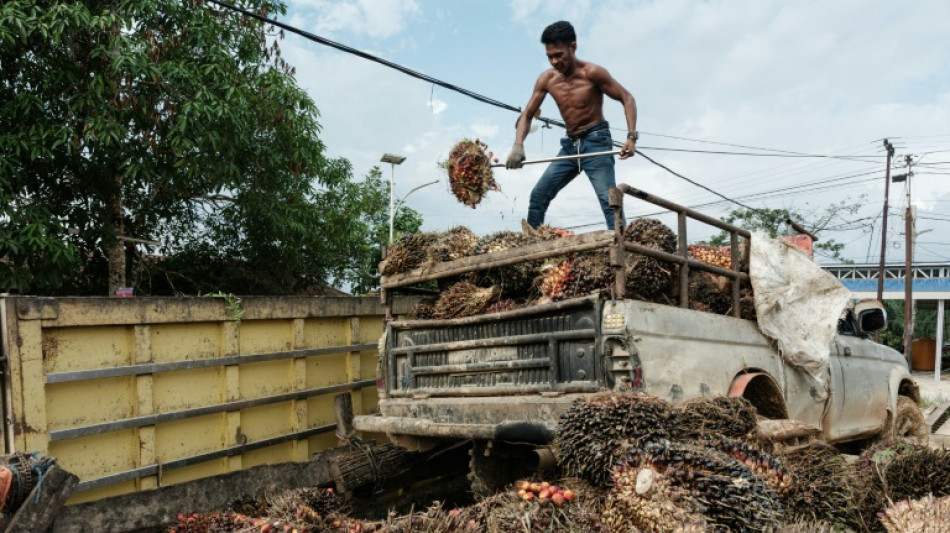
-
 'Perfect start' for ski great Vonn on World Cup return
'Perfect start' for ski great Vonn on World Cup return
-
Germany mourns five killed, hundreds wounded in Christmas market attack

-
 Odermatt soars to Val Gardena downhill win
Odermatt soars to Val Gardena downhill win
-
Mbappe's adaptation period over: Real Madrid's Ancelotti

-
 France's most powerful nuclear reactor finally comes on stream
France's most powerful nuclear reactor finally comes on stream
-
Ski great Vonn finishes 14th on World Cup return

-
 Scholz visits site of deadly Christmas market attack
Scholz visits site of deadly Christmas market attack
-
Heavyweight foes Usyk, Fury set for titanic rematch

-
 Drone attack hits Russian city 1,000km from Ukraine frontier
Drone attack hits Russian city 1,000km from Ukraine frontier
-
Former England winger Eastham dies aged 88

-
 Pakistan Taliban claim raid killing 16 soldiers
Pakistan Taliban claim raid killing 16 soldiers
-
Pakistan military courts convict 25 of pro-Khan unrest

-
 US Congress passes bill to avert shutdown
US Congress passes bill to avert shutdown
-
Sierra Leone student tackles toxic air pollution

-
 German leader to visit site of deadly Christmas market attack
German leader to visit site of deadly Christmas market attack
-
16 injured after Israel hit by Yemen-launched 'projectile'

-
 Google counters bid by US to force sale of Chrome
Google counters bid by US to force sale of Chrome
-
Russia says Kursk strike kills 5 after Moscow claims deadly Kyiv attack

-
 Cavaliers cruise past Bucks, Embiid shines in Sixers win
Cavaliers cruise past Bucks, Embiid shines in Sixers win
-
US President Biden authorizes $571 million in military aid to Taiwan

-
 Arahmaiani: the Indonesian artist with a thousand lives
Arahmaiani: the Indonesian artist with a thousand lives
-
Indonesians embrace return of plundered treasure from the Dutch

-
 Qualcomm scores key win in licensing dispute with Arm
Qualcomm scores key win in licensing dispute with Arm
-
Scientists observe 'negative time' in quantum experiments

-
 US approves first drug treatment for sleep apnea
US approves first drug treatment for sleep apnea
-
US drops bounty for Syria's new leader after Damascus meeting

-
 Saudi man arrested after deadly car attack on German Christmas market
Saudi man arrested after deadly car attack on German Christmas market
-
'Torn from my side': horror of German Christmas market attack

-
 Bayern Munich rout Leipzig on sombre night in Germany
Bayern Munich rout Leipzig on sombre night in Germany
-
Tiger in family golf event but has 'long way' before PGA return

-
 Pogba wants to 'turn page' after brother sentenced in extortion case
Pogba wants to 'turn page' after brother sentenced in extortion case
-
Court rules against El Salvador in controversial abortion case

-
 French court hands down heavy sentences in teacher beheading trial
French court hands down heavy sentences in teacher beheading trial
-
Israel army says troops shot Syrian protester in leg

-
 Tien sets-up all-American NextGen semi-final duel
Tien sets-up all-American NextGen semi-final duel
-
Bulked-up Fury promises 'war' in Usyk rematch

-
 Major reshuffle as Trudeau faces party pressure, Trump taunts
Major reshuffle as Trudeau faces party pressure, Trump taunts
-
Reggaeton star Daddy Yankee in court, says wife embezzled $100 mn

-
 Injured Eze out of Palace's clash with Arsenal
Injured Eze out of Palace's clash with Arsenal
-
Norway's Deila named coach of MLS Atlanta United

-
 Inter-American Court rules Colombia drilling violated native rights
Inter-American Court rules Colombia drilling violated native rights
-
Amazon expects no disruptions as US strike goes into 2nd day

-
 Man Utd 'more in control' under Amorim says Iraola
Man Utd 'more in control' under Amorim says Iraola
-
Emery insists Guardiola 'still the best' despite Man City slump

-
 US confirms billions in chips funds to Samsung, Texas Instruments
US confirms billions in chips funds to Samsung, Texas Instruments
-
English Rugby Football Union chairman quits amid pay row

-
 Major reshuffle as Trudeau faces party pressure, Trump attacks
Major reshuffle as Trudeau faces party pressure, Trump attacks
-
Gatland remains as Wales boss but must 'change fortunes on the pitch'

-
 Argentina's dollar craze cools under greenback-loving Milei
Argentina's dollar craze cools under greenback-loving Milei
-
Medici secret passageway in Florence reopens after refit


'Welcome relief': Asia producers hail EU deforestation law delay
Producers from Malaysia's palm oil industry to Vietnam's coffee sector on Thursday welcomed a European Union decision to delay implementation of its anti-deforestation rules.
The year-long delay triggered immediate outcry from environmental groups, but the legislation had faced substantial pushback from many governments and industries.
They criticised the law, which intended to prevent the import of products that drive deforestation, for confusing rules and complex documentation requirements that they said would particularly burden small-scale farmers.
The EU's decision to delay was a relief, said Trinh Duc Minh, chair of the Buon Ma Thuot Coffee Association.
"The extension of the timeline is necessary and reasonable," he told AFP, though he noted coffee prices that rose as companies stockpiled before the deadline might now drop.
Nguyen Xuan Loi, head of Vietnamese coffee exporter An Thai Group, also hailed the news as a "positive move".
"In reality, Vietnam has been strictly managing deforestation issues," he told AFP.
"There are hardly any violations anymore."
Global Forest Watch says Vietnam's primary forest loss has fallen from a peak in 2016, but the country still lost about 16,500 hectares in 2023, with commodity-driven deforestation a leading cause.
EU imports accounted for 16 percent of deforestation linked to global trade in 2017, according to WWF.
When the law was adopted in 2023 it was hailed as a major breakthrough to protect nature and the climate.
It requires exporters of cocoa, soy, timber, cattle, palm oil, rubber, coffee -- and items derived from those products -- to certify their goods were not produced on land deforested after December 2020.
- 'Welcome relief' -
Countries including Malaysia and Indonesia have vocally opposed the new rules and the chorus of criticism grew louder as the December implementation deadline neared, with Brazil and the United States among those voicing concern.
Malaysia's Palm Oil Council welcomed the proposed delay as a "victory for common sense".
The decision is a "welcome relief for all those businesses who highlighted the need for a delay," the body's head Belvinder Kaur Sron said.
"Malaysia has over the past two years consistently provided evidence... that the implementation date of 30th December 2024 was unworkable, and the EU systems were not ready," the council added in a statement.
It called for the EU to address outstanding demands, including exemptions for smallholders, clear benchmarking criteria and accepting Malaysia's sustainable palm oil standard.
In Indonesia, the country's leading palm oil association also welcomed the delay.
"Our calls have been listened to," said its chairman Eddy Martono, who also urged the EU to accept Indonesian sustainability standards and recognise its anti-deforestation efforts.
Palm oil is one of Indonesia's top commodity exports, but also a key driver of deforestation.
The country lost nearly 300,000 hectares of primary forest in 2023, an uptick from the previous year, though still down from the 2016 peak, according to Global Forest Watch.
Indonesian environmentalists warned that the EU delay was likely to mean more unchecked deforestation.
"We can't imagine how much more land-clearing or deforestation the one-year delay could cause in West Kalimantan and other places like Papua," said Uli Arta Siagian at Indonesian environmental group WALHI.
Uli acknowledged challenges in implementing the rules, but said there was no guarantee a year-long delay would fix those.
"It should have been implemented, and then the EU could see what needs to be corrected," she told AFP.
"For us, this decision is disappointing."
F.Cardoso--PC




